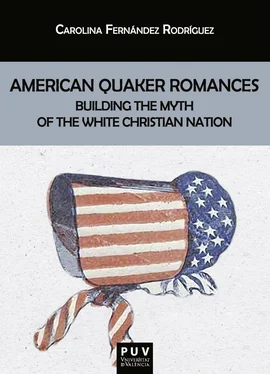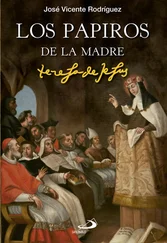It is likewise worth considering which publishing houses have invested in these historical romances with Quaker protagonists. Most of them have an unequivocal Christian agenda, 5 including Barbour, Harvest House, Revell and Shiloh Run Press, all of which are Evangelical publishers. They are responsible for publishing the works of the two four-in-one collections mentioned above, which were published by Barbour, as well as the romances of Mary Ellis (Harvest), Suzanne Woods Fisher (Revell), and Anna Schmidt (Shiloh Run Press). Quaker author Sue McCracken, for her part, had her romances published by Friends United Press, a Quaker publishing house. Unlike these publishing houses, others, like Camel Press (responsible for the publication of Carla Kelly’s romance), Walker Books (where Ann Turnbull’s romances appeared), or Five Star Publishing (in charge of Joanne Sundell’s romances) have no obvious connections with any particular faith. Yet other romances, particularly those published by Lyn Cote, have seen the light thanks to the Christian imprints of HarperCollins: Steeple Hill Books and Love Inspired Books (like the Wilderness Brides trilogy and the Gabriel Sisters trilogy). So, all in all, it is undeniable that historical romances with Quaker protagonists are mainly the object of interest of publishing houses with a clearly religious orientation, while the non-religious publishing houses which have published Quaker romances remain marginal within the market.
The authors’ backgrounds, too, show some diversity that is worth taking into account. Considering both the publishing house and the author’s backgrounds, it becomes possible to distinguish three groups of Quaker romances: first, Quaker romances properly speaking in so far as they have been written by Quaker authors (a total of six novels are found in this category); second, Evangelical romances with Quaker protagonists (there are twenty-three romances in this group); third, secular romances with Quaker protagonists (of which there are ten romances). Though this distinction will not be sustained in the structure of this book’s chapters, mostly based on thematic issues (history, gender, race and the twentieth-century world wars), it is one that is nonetheless worth bearing in mind, as it determines fundamental aspects of the novels under analysis, such as characterization, accuracy in the depiction of Quakerism, plot development or degree of deviation from the features of Christian romances generally agreed upon by romance scholars.
The first group, which comprises six romances, includes the works of Quaker writers Janet Whitney, Susan McCracken and Edith Maxwell. Janet Payne Whitney (1894-1974) was an English Quaker author. She moved to America in 1917 when she married George Gillett Whitney, who became Director of Fine Arts at Westtown Quaker School in Chester County, Pennsylvania. Janet Whitney taught Quakerism at the school and wrote several biographies of notable historical figures (such as Elizabeth Fry, John Woolman and Abigail Adams, among others), as well as five novels, of which Judith (1944), set in post-revolutionary Philadelphia, amply meets the requisites to be included in this book. Susan McCracken is a retired Quaker pastor at West Branch Friends Church in Iowa, part of Iowa Yearly Meeting (a group of Evangelical Friends churches in Iowa, Wisconsin, and Minnesota), whose romances, the Friends series, published by Friends United Press, a Quaker publishing house, came out in 1994, 1995, 1997 and 2001. For her part, Edith Maxwell is a member of a more liberal group, the Amesbury Quaker Meeting (which is part of the New England Yearly Meeting); she has authored a series of so-called “cozy” mysteries, the Quaker Midwife Mysteries, the first of which, Called to Justice (2017), features the investigation of a crime and a romance between the protagonist, a Quaker midwife and sleuth, and a young doctor.
Though these three authors are Quakers, they belong to different Quaker traditions: Janet Whitney was raised in the British one, while Susan McCracken and Edith Maxwell are American Friends. They, too, in turn are Quakers of various persuasions, as the former is closer to Evangelicalism, while the latter is a member of a more liberal Meeting. These distinctions make their being grouped together somehow incoherent, as, in truth, their portrayal of Quakerism differs a great deal. Nonetheless, their unique vision and knowledge of the Society of Friends as insiders, unlike the rest of the authors, all of whom are outsiders, recommends that their specificity be considered. As will be seen, their depiction of the heroine’s plain dress, to give an example, in not drawn by the desire to exoticize the female protagonist, nor is their portrayal of the rituals, beliefs and customs of eighteenthand nineteenth-century Quakers so conspicuously marred by anachronisms or misrepresentations as is the case of other non-Quaker writers. Still, Susan McCracken’s novels are characterized by a strong didactic goal—one could even call it an evangelical zeal—that is more informative in the case of Maxwell’s novel, and nearly anecdotal in that of Whitney’s. Consequently, generalizations should be out of the question because each of these Quaker authors has their own objectives when it comes to imagining Quaker brides in a historical context.
The second group of romances I have identified is comprised by twenty-three novels published by Evangelical publishing houses or the Christian imprint of a publishing house. They are far more numerous, which raises a question about why Evangelical authors would wish to appropriate Quakerism and Quaker characters. Among this group one can find Mary Ellis’s The Quaker and the Rebel (2014) and Susanne Woods Fisher’s the Nantucket Legacy trilogy (2018), published by Harvest House Publishers and Revell, respectively. Barbour, another Evangelical publishing house, has published two four-in-one collections: A Quaker Christmas (2011) and The Quakers of New Garden (2012), both of which contain novellas that meet the criteria used in this book (with one exception: the fourth novella in The Quakers of New Garden , “New Garden’s Conversion,” by Susette Williams, has been left out, as it is contemporary, not historical). Anna Schmidt’s The Peacemakers trilogy (2013-2014) has been published by Barbour and Shiloh Run Press. This group also includes some of Lyn Cote’s works. Of all the writers of Quaker romances, Cote is, by far, the most prolific. To date, she has authored three series: the Gabriel Sisters trilogy (2008, 2009 and 2010), the Wilderness Brides trilogy (the second book in the series, The Baby Bequest , has been left out, as there are no Quaker protagonists in it, so only the first book, that came out in 2012, and the third one, published in 2014, are considered), and the Quaker Brides tetralogy (2014-2016). The first two series appeared with Steeple Hill, one of the Christian imprints of HarperCollins, but the latter was published by Tyndale House Publishers, an Evangelical publishing house. As will be proved, this group of romances is more prone to adhere to the features that typically characterize Christian romances, as for instance a preference for “clean” stories, with no explicit sex scenes, and they also seem to show a tendency to dilute Quakerism or to assimilate it to Evangelicalism.
Finally, it is possible to distinguish a third group of romances that feature Quaker protagonists but cannot be considered, properly speaking, inspirational fiction, since they are not published by companies with an obvious religious goal. The group of secular romances includes ten works. Among them one may find novels like Suzanne Simmons Guntrum’s The Golden Raintree (Harlequin, 1990), Miranda Jarrett’s Spindrift (Harlequin Historicals, 1993); Carla Kelly’s Miss Whittier Makes a List (Camel Press, 1994); Eileen Charbonneau’s The Randolph Legacy (Forge, 1997); Catherine Archibald’s Loving Charity (Leisure Books, 2000); Sarah McCarty’s Tucker’s Claim (Spice Books, 2009); Joanne Sundell’s The Quaker and the Confederate books, which comprise two novels: Hearts Divided (Gale Cengage Learning, 2010a) and Hearts Persuaded (Gale Cengage Learning, 2010b); Ann Turnbull’s Seeking Eden (Walker Books, 2012c), and Donna Thorland’s The Turncoat (Penguin, 2013). Strictly speaking, the novels in this group fail to follow basic tenets of inspirational fiction, but I have nonetheless decided to include them in my analysis for comparative reasons and because, in some cases, the line that separates them from inspirational romances is not clear-cut.
Читать дальше












